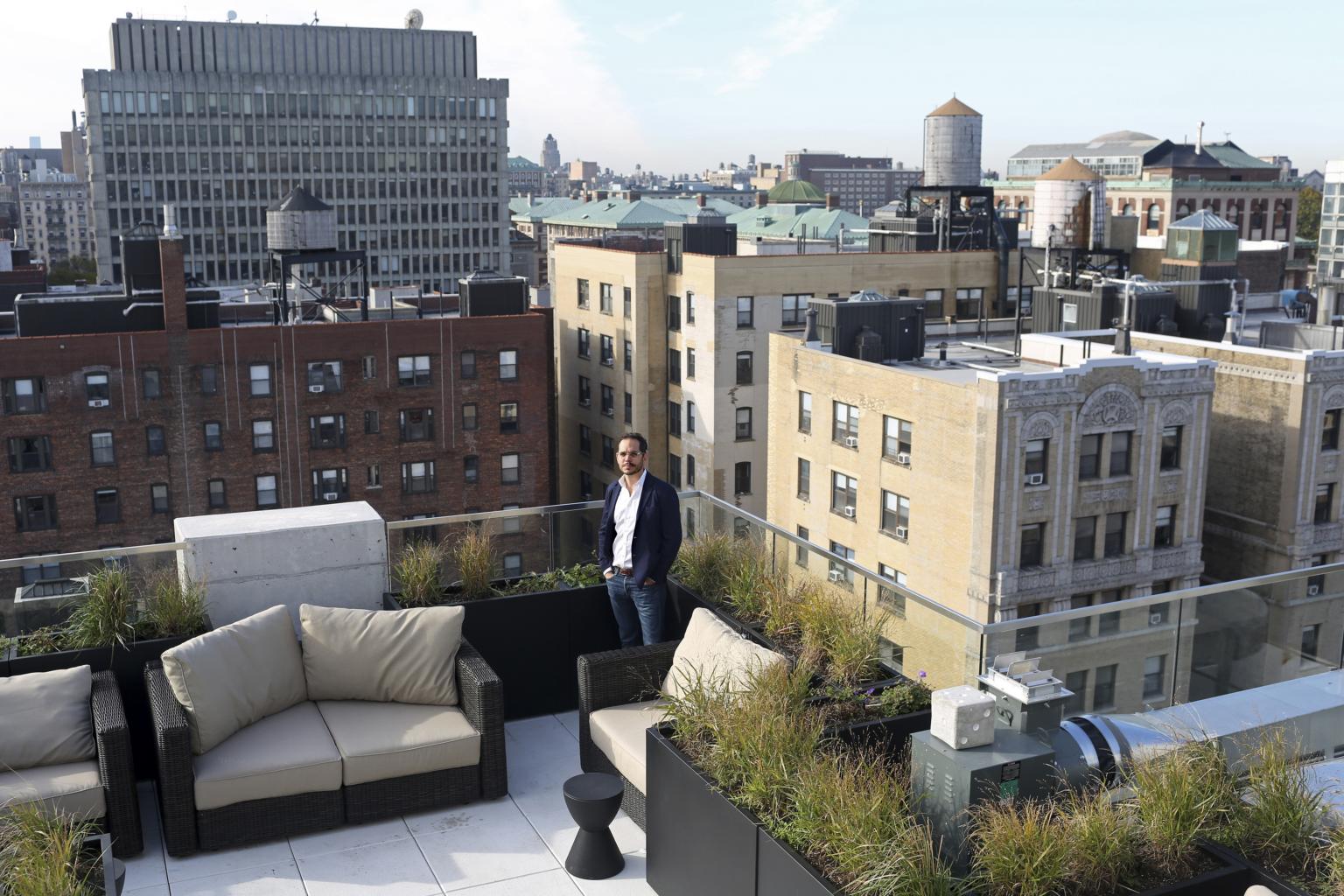US student dorms turn trendy homes
Sign up now: Get ST's newsletters delivered to your inbox

Pebb Capital managing director James Jago on the rooftop of Monarch Heights, which is being marketed to young white-collar workers in New York.
PHOTO: NYTIMES
Follow topic:
(NYTIMES) - When Yeshiva University in the United States got into financial trouble a few years ago, some property developers saw an opportunity.
To free up cash, the oldest school in the country began selling pieces of its real estate, including the Alabama, a student housing property in Manhattan that served students at Yeshiva's Cardozo Law School.
Pebb Capital and its partner, TriArch Real Estate, bought the building for US$58 million (S$77 million) in 2016, blowing out interior walls and converting it from a dated dormitory into sleek, furnished apartments. The investors nearly doubled their money, selling the building for US$104 million in February this year; it now houses a mix of graduate students and young professionals.
"It's not just students who want this sort of product," said Pebb managing director James Jago. Demand for inexpensive housing options is rising among those new to the workforce.
Pebb was not the only real estate firm to realise this. Other investors are also seeking opportunities to acquire dorms from struggling universities and convert them into housing for white-collar workers.
Thirty per cent of American universities, both public and private, are running deficits, according to Moody's Investors Service, and the Covid-19 pandemic has only added to financial pressures - virtual learning has put campuses into deep freeze, with online classes slashing the population of students who would have otherwise patronised campus bookstores, coffee shops and sporting events.
Since the pandemic hit, Pebb has overhauled two more student housing properties: The Cadence, in Tucson, Arizona, and Monarch Heights, in the Washington Heights section of Manhattan, are now upscale apartments aimed at students and young professionals.
The shift has been playing out for years as universities face shrinking enrolments and ballooning debts, but as the pandemic worsens, more college real estate will be redeveloped or sold, experts say.
Atlantic Union College in Lancaster, Massachusetts, which closed in 2018, listed its campus for sale in January; Unity College in Maine is considering doing the same.
In Vermont, Marlboro College sold its 202ha campus in May and shut down shortly after. The Benjamin Franklin Institute of Technology in Boston announced in September that its South End campus would become a mixed-use site anchored by a nursing home.
The US has the world's largest student housing market, representing US$11 billion in real estate investments.
And as the pandemic drags on and more universities feel the cash crunch, the endowment gap between legacy campuses such as Harvard and Yale and smaller colleges is only going to grow.
The Cadence was offering a rent-by-the-bedroom model before it was acquired by Pebb Capital in September for US$33 million in a partnership with Coastal Ridge Real Estate.
Pebb is planning a US$12 million renovation to convert the property into studios and one- and two-bedroom apartments, bringing in amenities and design touches to attract young professionals who are moving to Tucson in droves, many from nearby states like California, where real estate prices are significantly higher.
The building is a five-minute drive from the University of Arizona, Tucson, which makes it ideal for students wanting to live off campus. Once renovations are complete, rents will no longer be offered by the bedroom.
Mr Jago said: "We're going to become the prime downtown multifamily property for young professionals, and maybe upper-class or graduate students... who want to get away from the undergrads throwing up outside the bar."
Mr Jacob Baumstein is a sophomore studying information science in a joint programme at Columbia University and the Jewish Theological Seminary. Despite all of his classes being held online this year, he moved from his parents' home in Charlotte, North Carolina, to Pebb's Monarch Heights building.
"If I were in a building of all students, it would be a ghost town," he said. "Because we have young professionals here, there's life and a community feel."
Privately owned student housing properties, which often offer better amenities and more modern decor than on-campus housing options, still report steady income.
Noting that they collected 98 per cent of their revenue despite the pandemic, Mr David Adelman, chief executive of Campus Apartments, a student housing provider with properties in 15 states, said his properties are down only about 5 percentage points in occupancy this year, a strong sign that the demand for student housing remains.
Mr Jago of Pebb agreed. "Covid-19 hasn't really changed anything for us," he said of his business strategy. "It was a catalyst for existing trends that were already in place."

